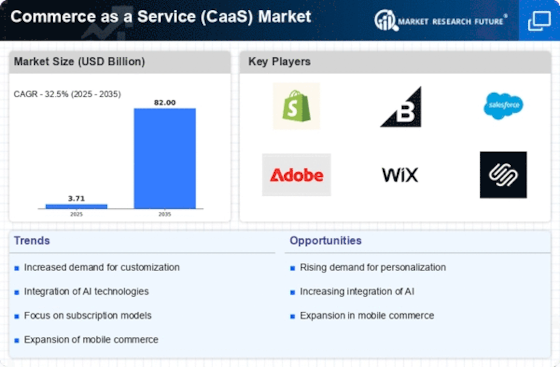-
EXECUTIVE SUMMARY
-
MARKET INTRODUCTION
-
Definition
-
Scope of the Study
- Research Objective
- Assumptions
- Limitations
-
RESEARCH METHODOLOGY
-
Overview
-
Data Mining
-
Secondary Research
-
Primary Research
- Primary Interviews and Information Gathering Process
- Breakdown of Primary Respondents
-
Forecasting Modality
-
Market Size Estimation
- Bottom-Up Approach
- Top-Down Approach
-
Data Triangulation
-
Validation
-
MARKET DYNAMICS
-
Overview
-
Drivers
-
Restraints
-
Opportunities
-
MARKET FACTOR ANALYSIS
-
Value Chain Analysis
-
Porter’s Five Forces Analysis
- Bargaining Power of Suppliers
- Bargaining Power of Buyers
- Threat of New Entrants
- Threat of Substitutes
- Intensity of Rivalry
-
COVID-19 Impact Analysis
- Market Impact Analysis
- Regional Impact
- Opportunity and Threat Analysis
-
GLOBAL COMMERCE AS A SERVICE (CAAS) MARKET, BY COMPONENT
-
Overview
-
Solutions
-
Services
-
GLOBAL COMMERCE AS A SERVICE (CAAS) MARKET, BY SOLUTION TYPE
-
Overview
-
Content & site management
-
Product information management
-
Experience management
-
Inventory & order management
-
Payment process management
-
Multi-site Management
-
GLOBAL COMMERCE AS A SERVICE (CAAS) MARKET, BY DELIVERY MODEL
-
Overview
-
B2B
-
B2C
-
Machine-2-machine commerce
-
GLOBAL COMMERCE AS A SERVICE (CAAS) MARKET, BY DEPLOYMENT TYPE
-
Overview
-
Public
-
Private
-
Hybrid
-
GLOBAL COMMERCE AS A SERVICE (CAAS) MARKET, BY REGION
-
Overview
-
North America
- U.S.
- Canada
-
Europe
- Germany
- France
- U.K
- Italy
- Spain
- Rest of Europe
-
Asia-Pacific
- China
- India
- Japan
- South Korea
- Australia
- Rest of Asia-Pacific
-
Rest of the World
- Middle East
- Africa
- Latin America
-
COMPETITIVE LANDSCAPE
-
Overview
-
Competitive Analysis
-
Market Share Analysis
-
Major Growth Strategy in the Global Commerce as a Service (CaaS) Market,
-
Competitive Benchmarking
-
Leading Players in Terms of Number of Developments in the Global Commerce as a Service (CaaS) Market,
-
Key developments and Growth Strategies
- New Component Launch/Solution Type Delivery model
- Merger & Acquisitions
- Joint Ventures
-
Major Players Financial Matrix
- Sales & Operating Income, 2022
- Major Players R&D Expenditure. 2022
-
COMPANY PROFILES
-
MICROSOFT CORPORATION
- Company Overview
- Financial Overview
- Component s Offered
- Key Developments
- SWOT Analysis
- Key Strategies
-
Rackspace Hosting, Inc
- Company Overview
- Financial Overview
- Component s Offered
- Key Developments
- SWOT Analysis
- Key Strategies
-
AMAZON WEB SERVICES, INC..
- Company Overview
- Financial Overview
- Component s Offered
- Key Developments
- SWOT Analysis
- Key Strategies
-
Alibaba Cloud
- Company Overview
- Financial Overview
- Component s Offered
- Key Developments
- SWOT Analysis
- Key Strategies
-
Cisco System.
- Company Overview
- Financial Overview
- Component s Offered
- Key Developments
- SWOT Analysis
- Key Strategies
-
GOOGLE LLC.
- Company Overview
- Financial Overview
- Component s Offered
- Key Developments
- SWOT Analysis
- Key Strategies
-
Dell Technologies Inc.
- Company Overview
- Financial Overview
- Component s Offered
- Key Developments
- SWOT Analysis
- Key Strategies
-
Oracle Corporation.
- Company Overview
- Financial Overview
- Component s Offered
- Key Developments
- SWOT Analysis
- Key Strategies
-
Hewlett Packard Enterprise Development LP
- Company Overview
- Financial Overview
- Component s Offered
- Key Developments
- SWOT Analysis
- Key Strategies
-
International Business Machine (IBM) Corporation
- Company Overview
- Financial Overview
- Component s Offered
- Key Developments
- SWOT Analysis
- Key Strategies
-
APPENDIX
-
References
-
Related Reports
-
-
LIST OF TABLES
-
GLOBAL COMMERCE AS A SERVICE (CAAS) MARKET, SYNOPSIS, 2018-2032
-
GLOBAL COMMERCE AS A SERVICE (CAAS) MARKET, ESTIMATES & FORECAST, 2018-2032 (USD BILLION)
-
GLOBAL COMMERCE AS A SERVICE (CAAS) MARKET, BY COMPONENT , 2018-2032 (USD BILLION)
-
GLOBAL COMMERCE AS A SERVICE (CAAS) MARKET, BY SOLUTION TYPE, 2018-2032 (USD BILLION)
-
GLOBAL COMMERCE AS A SERVICE (CAAS) MARKET, BY DELIVERY MODEL, 2018-2032 (USD BILLION)
-
GLOBAL COMMERCE AS A SERVICE (CAAS) MARKET, BY DEPLOYMENT TYPE, 2018-2032 (USD BILLION)
-
NORTH AMERICA COMMERCE AS A SERVICE (CAAS) MARKET, BY COMPONENT , 2018-2032 (USD BILLION)
-
NORTH AMERICA COMMERCE AS A SERVICE (CAAS) MARKET, BY SOLUTION TYPE, 2018-2032 (USD BILLION)
-
NORTH AMERICA COMMERCE AS A SERVICE (CAAS) MARKET, BY DELIVERY MODEL, 2018-2032 (USD BILLION)
-
NORTH AMERICA COMMERCE AS A SERVICE (CAAS) MARKET, BY DEPLOYMENT TYPE, 2018-2032 (USD BILLION)
-
NORTH AMERICA COMMERCE AS A SERVICE (CAAS) MARKET, BY COUNTRY, 2018-2032 (USD BILLION)
-
U.S. COMMERCE AS A SERVICE (CAAS) MARKET, BY COMPONENT , 2018-2032 (USD BILLION)
-
U.S. COMMERCE AS A SERVICE (CAAS) MARKET, BY SOLUTION TYPE, 2018-2032 (USD BILLION)
-
U.S. COMMERCE AS A SERVICE (CAAS) MARKET, BY DELIVERY MODEL, 2018-2032 (USD BILLION)
-
U.S. COMMERCE AS A SERVICE (CAAS) MARKET, BY DEPLOYMENT TYPE, 2018-2032 (USD BILLION)
-
CANADA COMMERCE AS A SERVICE (CAAS) MARKET, BY COMPONENT , 2018-2032 (USD BILLION)
-
CANADA COMMERCE AS A SERVICE (CAAS) MARKET, BY SOLUTION TYPE, 2018-2032 (USD BILLION)
-
CANADA COMMERCE AS A SERVICE (CAAS) MARKET, BY DELIVERY MODEL, 2018-2032 (USD BILLION)
-
CANADA COMMERCE AS A SERVICE (CAAS) MARKET, BY DEPLOYMENT TYPE, 2018-2032 (USD BILLION)
-
EUROPE COMMERCE AS A SERVICE (CAAS) MARKET, BY COMPONENT , 2018-2032 (USD BILLION)
-
EUROPE COMMERCE AS A SERVICE (CAAS) MARKET, BY SOLUTION TYPE, 2018-2032 (USD BILLION)
-
EUROPE COMMERCE AS A SERVICE (CAAS) MARKET, BY DELIVERY MODEL, 2018-2032 (USD BILLION)
-
EUROPE COMMERCE AS A SERVICE (CAAS) MARKET, BY DEPLOYMENT TYPE, 2018-2032 (USD BILLION)
-
EUROPE COMMERCE AS A SERVICE (CAAS) MARKET, BY COUNTRY, 2018-2032 (USD BILLION)
-
GERMANY COMMERCE AS A SERVICE (CAAS) MARKET, BY COMPONENT , 2018-2032 (USD BILLION)
-
GERMANY COMMERCE AS A SERVICE (CAAS) MARKET, BY SOLUTION TYPE, 2018-2032 (USD BILLION)
-
GERMANY COMMERCE AS A SERVICE (CAAS) MARKET, BY DELIVERY MODEL, 2018-2032 (USD BILLION)
-
GERMANY COMMERCE AS A SERVICE (CAAS) MARKET, BY DEPLOYMENT TYPE, 2018-2032 (USD BILLION)
-
FRANCE COMMERCE AS A SERVICE (CAAS) MARKET, BY COMPONENT , 2018-2032 (USD BILLION)
-
FRANCE COMMERCE AS A SERVICE (CAAS) MARKET, BY SOLUTION TYPE, 2018-2032 (USD BILLION)
-
FRANCE COMMERCE AS A SERVICE (CAAS) MARKET, BY DELIVERY MODEL, 2018-2032 (USD BILLION)
-
FRANCE COMMERCE AS A SERVICE (CAAS) MARKET, BY DEPLOYMENT TYPE, 2018-2032 (USD BILLION)
-
ITALY COMMERCE AS A SERVICE (CAAS) MARKET, BY COMPONENT , 2018-2032 (USD BILLION)
-
ITALY COMMERCE AS A SERVICE (CAAS) MARKET, BY SOLUTION TYPE, 2018-2032 (USD BILLION)
-
ITALY COMMERCE AS A SERVICE (CAAS) MARKET, BY DELIVERY MODEL, 2018-2032 (USD BILLION)
-
ITALY COMMERCE AS A SERVICE (CAAS) MARKET, BY DEPLOYMENT TYPE, 2018-2032 (USD BILLION)
-
SPAIN COMMERCE AS A SERVICE (CAAS) MARKET, BY COMPONENT , 2018-2032 (USD BILLION)
-
SPAIN COMMERCE AS A SERVICE (CAAS) MARKET, BY SOLUTION TYPE, 2018-2032 (USD BILLION)
-
SPAIN COMMERCE AS A SERVICE (CAAS) MARKET, BY DELIVERY MODEL, 2018-2032 (USD BILLION)
-
SPAIN COMMERCE AS A SERVICE (CAAS) MARKET, BY DEPLOYMENT TYPE, 2018-2032 (USD BILLION)
-
U.K COMMERCE AS A SERVICE (CAAS) MARKET, BY COMPONENT , 2018-2032 (USD BILLION)
-
U.K COMMERCE AS A SERVICE (CAAS) MARKET, BY SOLUTION TYPE, 2018-2032 (USD BILLION)
-
U.K COMMERCE AS A SERVICE (CAAS) MARKET, BY DELIVERY MODEL, 2018-2032 (USD BILLION)
-
U.K COMMERCE AS A SERVICE (CAAS) MARKET, BY DEPLOYMENT TYPE, 2018-2032 (USD BILLION)
-
REST OF EUROPE COMMERCE AS A SERVICE (CAAS) MARKET, BY COMPONENT , 2018-2032 (USD BILLION)
-
REST OF EUROPE COMMERCE AS A SERVICE (CAAS) MARKET, BY SOLUTION TYPE, 2018-2032 (USD BILLION)
-
REST OF EUROPE COMMERCE AS A SERVICE (CAAS) MARKET, BY DELIVERY MODEL, 2018-2032 (USD BILLION)
-
REST OF EUROPE COMMERCE AS A SERVICE (CAAS) MARKET, BY DEPLOYMENT TYPE, 2018-2032 (USD BILLION)
-
ASIA PACIFIC COMMERCE AS A SERVICE (CAAS) MARKET, BY COMPONENT , 2018-2032 (USD BILLION)
-
ASIA PACIFIC COMMERCE AS A SERVICE (CAAS) MARKET, BY SOLUTION TYPE, 2018-2032 (USD BILLION)
-
ASIA PACIFIC COMMERCE AS A SERVICE (CAAS) MARKET, BY DELIVERY MODEL, 2018-2032 (USD BILLION)
-
ASIA PACIFIC COMMERCE AS A SERVICE (CAAS) MARKET, BY DEPLOYMENT TYPE, 2018-2032 (USD BILLION)
-
ASIA PACIFIC COMMERCE AS A SERVICE (CAAS) MARKET, BY COUNTRY, 2018-2032 (USD BILLION)
-
JAPAN COMMERCE AS A SERVICE (CAAS) MARKET, BY COMPONENT , 2018-2032 (USD BILLION)
-
JAPAN COMMERCE AS A SERVICE (CAAS) MARKET, BY SOLUTION TYPE, 2018-2032 (USD BILLION)
-
JAPAN COMMERCE AS A SERVICE (CAAS) MARKET, BY DELIVERY MODEL, 2018-2032 (USD BILLION)
-
JAPAN COMMERCE AS A SERVICE (CAAS) MARKET, BY DEPLOYMENT TYPE, 2018-2032 (USD BILLION)
-
CHINA COMMERCE AS A SERVICE (CAAS) MARKET, BY COMPONENT , 2018-2032 (USD BILLION)
-
CHINA COMMERCE AS A SERVICE (CAAS) MARKET, BY SOLUTION TYPE, 2018-2032 (USD BILLION)
-
CHINA COMMERCE AS A SERVICE (CAAS) MARKET, BY DELIVERY MODEL, 2018-2032 (USD BILLION)
-
CHINA COMMERCE AS A SERVICE (CAAS) MARKET, BY DEPLOYMENT TYPE, 2018-2032 (USD BILLION)
-
INDIA COMMERCE AS A SERVICE (CAAS) MARKET, BY COMPONENT , 2018-2032 (USD BILLION)
-
INDIA COMMERCE AS A SERVICE (CAAS) MARKET, BY SOLUTION TYPE, 2018-2032 (USD BILLION)
-
INDIA COMMERCE AS A SERVICE (CAAS) MARKET, BY DELIVERY MODEL, 2018-2032 (USD BILLION)
-
INDIA COMMERCE AS A SERVICE (CAAS) MARKET, BY DEPLOYMENT TYPE, 2018-2032 (USD BILLION)
-
AUSTRALIA COMMERCE AS A SERVICE (CAAS) MARKET, BY COMPONENT , 2018-2032 (USD BILLION)
-
AUSTRALIA COMMERCE AS A SERVICE (CAAS) MARKET, BY SOLUTION TYPE, 2018-2032 (USD BILLION)
-
AUSTRALIA COMMERCE AS A SERVICE (CAAS) MARKET, BY DELIVERY MODEL, 2018-2032 (USD BILLION)
-
AUSTRALIA COMMERCE AS A SERVICE (CAAS) MARKET, BY DEPLOYMENT TYPE, 2018-2032 (USD BILLION)
-
SOUTH KOREA COMMERCE AS A SERVICE (CAAS) MARKET, BY COMPONENT , 2018-2032 (USD BILLION)
-
SOUTH KOREA COMMERCE AS A SERVICE (CAAS) MARKET, BY SOLUTION TYPE, 2018-2032 (USD BILLION)
-
SOUTH KOREA COMMERCE AS A SERVICE (CAAS) MARKET, BY DELIVERY MODEL, 2018-2032 (USD BILLION)
-
SOUTH KOREA COMMERCE AS A SERVICE (CAAS) MARKET, BY DEPLOYMENT TYPE, 2018-2032 (USD BILLION)
-
REST OF ASIA-PACIFIC COMMERCE AS A SERVICE (CAAS) MARKET, BY COMPONENT , 2018-2032 (USD BILLION)
-
REST OF ASIA-PACIFIC COMMERCE AS A SERVICE (CAAS) MARKET, BY SOLUTION TYPE, 2018-2032 (USD BILLION)
-
REST OF ASIA-PACIFIC COMMERCE AS A SERVICE (CAAS) MARKET, BY DELIVERY MODEL, 2018-2032 (USD BILLION)
-
REST OF ASIA-PACIFIC COMMERCE AS A SERVICE (CAAS) MARKET, BY DEPLOYMENT TYPE, 2018-2032 (USD BILLION)
-
REST OF WORLD COMMERCE AS A SERVICE (CAAS) MARKET, BY COMPONENT , 2018-2032 (USD BILLION)
-
REST OF WORLD COMMERCE AS A SERVICE (CAAS) MARKET, BY SOLUTION TYPE, 2018-2032 (USD BILLION)
-
REST OF WORLD COMMERCE AS A SERVICE (CAAS) MARKET, BY DELIVERY MODEL, 2018-2032 (USD BILLION)
-
REST OF WORLD COMMERCE AS A SERVICE (CAAS) MARKET, BY DEPLOYMENT TYPE, 2018-2032 (USD BILLION)
-
REST OF WORLD COMMERCE AS A SERVICE (CAAS) MARKET, BY COUNTRY, 2018-2032 (USD BILLION)
-
MIDDLE EAST COMMERCE AS A SERVICE (CAAS) MARKET, BY COMPONENT , 2018-2032 (USD BILLION)
-
MIDDLE EAST COMMERCE AS A SERVICE (CAAS) MARKET, BY SOLUTION TYPE, 2018-2032 (USD BILLION)
-
MIDDLE EAST COMMERCE AS A SERVICE (CAAS) MARKET, BY DELIVERY MODEL, 2018-2032 (USD BILLION)
-
MIDDLE EAST COMMERCE AS A SERVICE (CAAS) MARKET, BY DEPLOYMENT TYPE, 2018-2032 (USD BILLION)
-
AFRICA COMMERCE AS A SERVICE (CAAS) MARKET, BY COMPONENT , 2018-2032 (USD BILLION)
-
AFRICA COMMERCE AS A SERVICE (CAAS) MARKET, BY SOLUTION TYPE, 2018-2032 (USD BILLION)
-
AFRICA COMMERCE AS A SERVICE (CAAS) MARKET, BY DELIVERY MODEL, 2018-2032 (USD BILLION)
-
AFRICA COMMERCE AS A SERVICE (CAAS) MARKET, BY DEPLOYMENT TYPE, 2018-2032 (USD BILLION)
-
LATIN AMERICA COMMERCE AS A SERVICE (CAAS) MARKET, BY COMPONENT , 2018-2032 (USD BILLION)
-
LATIN AMERICA COMMERCE AS A SERVICE (CAAS) MARKET, BY SOLUTION TYPE, 2018-2032 (USD BILLION)
-
LATIN AMERICA COMMERCE AS A SERVICE (CAAS) MARKET, BY DELIVERY MODEL, 2018-2032 (USD BILLION)
-
LATIN AMERICA COMMERCE AS A SERVICE (CAAS) MARKET, BY DEPLOYMENT TYPE, 2018-2032 (USD BILLION)
-
-
LIST OF FIGURES
-
RESEARCH PROCESS
-
MARKET STRUCTURE FOR THE GLOBAL COMMERCE AS A SERVICE (CAAS) MARKET
-
MARKET DYNAMICS FOR THE GLOBAL COMMERCE AS A SERVICE (CAAS) MARKET
-
GLOBAL COMMERCE AS A SERVICE (CAAS) MARKET, SHARE (%), BY COMPONENT , 2022
-
GLOBAL COMMERCE AS A SERVICE (CAAS) MARKET, SHARE (%), BY SOLUTION TYPE, 2022
-
GLOBAL COMMERCE AS A SERVICE (CAAS) MARKET, SHARE (%), BY DELIVERY MODEL, 2022
-
GLOBAL COMMERCE AS A SERVICE (CAAS) MARKET, SHARE (%), BY DEPLOYMENT TYPE, 2022
-
GLOBAL COMMERCE AS A SERVICE (CAAS) MARKET, SHARE (%), BY REGION, 2022
-
NORTH AMERICA: COMMERCE AS A SERVICE (CAAS) MARKET, SHARE (%), BY REGION, 2022
-
EUROPE: COMMERCE AS A SERVICE (CAAS) MARKET, SHARE (%), BY REGION, 2022
-
ASIA-PACIFIC: COMMERCE AS A SERVICE (CAAS) MARKET, SHARE (%), BY REGION, 2022
-
REST OF THE WORLD: COMMERCE AS A SERVICE (CAAS) MARKET, SHARE (%), BY REGION, 2022
-
GLOBAL COMMERCE AS A SERVICE (CAAS) MARKET: COMPANY SHARE ANALYSIS, 2022 (%)
-
MICROSOFT CORPORATION: FINANCIAL OVERVIEW SNAPSHOT
-
MICROSOFT CORPORATION: SWOT ANALYSIS
-
RACKSPACE HOSTING, INC: FINANCIAL OVERVIEW SNAPSHOT
-
RACKSPACE HOSTING, INC: SWOT ANALYSIS
-
AMAZON WEB SERVICES, INC..: FINANCIAL OVERVIEW SNAPSHOT
-
AMAZON WEB SERVICES, INC..: SWOT ANALYSIS
-
ALIBABA CLOUD: FINANCIAL OVERVIEW SNAPSHOT
-
ALIBABA CLOUD: SWOT ANALYSIS
-
CISCO SYSTEM..: FINANCIAL OVERVIEW SNAPSHOT
-
CISCO SYSTEM..: SWOT ANALYSIS
-
GOOGLE LLC.: FINANCIAL OVERVIEW SNAPSHOT
-
GOOGLE LLC.: SWOT ANALYSIS
-
DELL TECHNOLOGIES INC.: FINANCIAL OVERVIEW SNAPSHOT
-
DELL TECHNOLOGIES INC.: SWOT ANALYSIS
-
ORACLE CORPORATION.: FINANCIAL OVERVIEW SNAPSHOT
-
ORACLE CORPORATION.: SWOT ANALYSIS
-
HEWLETT PACKARD ENTERPRISE DEVELOPMENT LP: FINANCIAL OVERVIEW SNAPSHOT
-
HEWLETT PACKARD ENTERPRISE DEVELOPMENT LP: SWOT ANALYSIS
-
INTERNATIONAL BUSINESS MACHINE (IBM) CORPORATION: FINANCIAL OVERVIEW SNAPSHOT
-
INTERNATIONAL BUSINESS MACHINE (IBM) CORPORATION: SWOT ANALYSIS'


















Leave a Comment